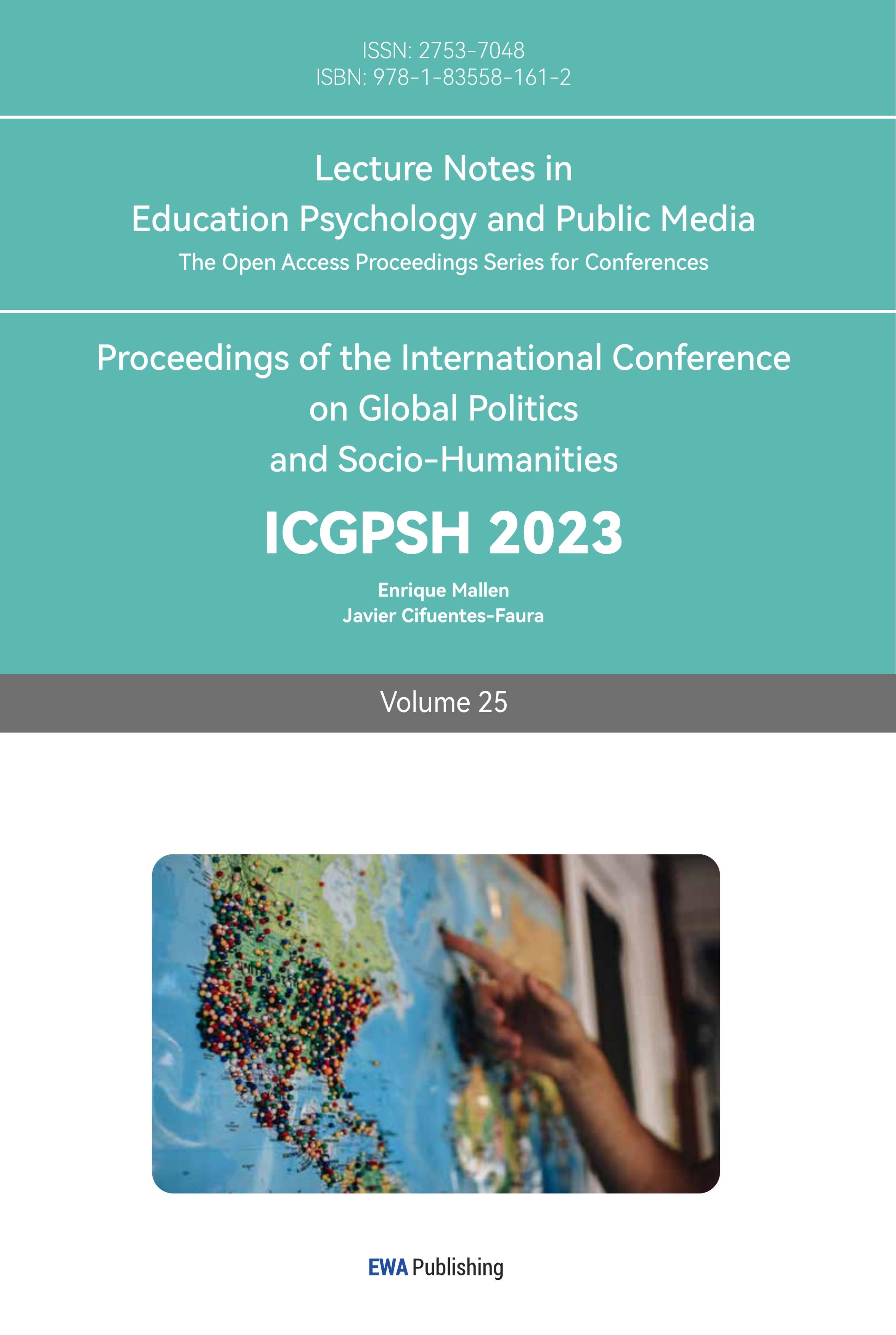References
[1]. Kindler, H, Regelmann, A, C, Tullney, M. (2004). Die Folgen der Agenda 2010 : alte und neue Zwänge des Sozialstaats. Retrieved from: https://searchworks.stanford.edu/view/5794048
[2]. Zhao, J. (2018). Holding fast amid the glitz and glamour: The mystery of Germany’s stable economic growth. https://chn.oversea.cnki.net/KCMS/detail/detail.aspx?dbcode=CJFD&dbname=CJFDLAST2018&filename=XXJR201810017&uniplatform=OVERSEA&v=rxDZrREbDy7izCkUC53fH6YxfTT73oaVG93_83q8qRWv6sqk-5OPD019K_zBJhQN
[3]. https://zh.tradingeconomics.com/
[4]. Öchsner, T. (2013). Was von der Agenda 2010 geblieben ist. Retrieved from: http://www.sueddeutsche.de/wirtschaft/schroeders-reform-des-arbeitsmarktes-was-von-der-agenda-geblieben-ist-1.1620192
[5]. Schiller, C and Anke Hassel, A. (2010). Der Fall Hartz IV. Wie es zur Agenda 2010 kam und wie es weitergeht. Retrieved from: https://www.researchgate.net/publication/262186318_Der_Fall_Hartz_IV_Wie_es_zur_Agenda_2010_kam_und_wie_es_weitergeht
[6]. Reisenbichler, A and Morgan, K, J. (2012). From ‘‘Sick Man’’ to ‘‘Miracle’’: Explaining the Robustness of the German Labor Market During and After the Financial Crisis 2008-09. Retrieved from: http://pas.sagepub.com/content/40/4/549
[7]. Dustmann, C, Fitzenberger, B, Schönberg, Uta and Oener, A, S. (2014). From Sick Man of Europe to Economic Superstar: Germany’s Resurgent Economy. Journal of Economic Perspectives. Vol 28, No.1.
[8]. Cai, W. (2013). Characteristics of Germany’s economic development and inspiration. Journal of Shandong Administrative College, 6,79-81.
[9]. Hogrefe, J, B and Groll, D. (2010). The German Labour Market Miracle. Retrieved from: https://journals.sagepub.com/doi/abs/10.1177/0027950110389760
[10]. Delft University of Technology, The Netherlands. (2015). Crisis and recovery in the German economy: The real lessons. Retrieved from: www.elsevier.com/locate/sced
[11]. Wang, Y, Z. (2014). “Competitive, deflation” model analysis of German foreign trade competitiveness. Retrieved from: https://kns.cnki.net/KCMS/detail/detail.aspx?dbname=CDFD1214&filename=1014383020.nh
Cite this article
Wang,Y. (2023). How the German Economy Went from Being the “Sick Man of Europe” to Being a European Leader. Lecture Notes in Education Psychology and Public Media,25,221-229.
Data availability
The datasets used and/or analyzed during the current study will be available from the authors upon reasonable request.
Disclaimer/Publisher's Note
The statements, opinions and data contained in all publications are solely those of the individual author(s) and contributor(s) and not of EWA Publishing and/or the editor(s). EWA Publishing and/or the editor(s) disclaim responsibility for any injury to people or property resulting from any ideas, methods, instructions or products referred to in the content.
About volume
Volume title: Proceedings of the International Conference on Global Politics and Socio-Humanities
© 2024 by the author(s). Licensee EWA Publishing, Oxford, UK. This article is an open access article distributed under the terms and
conditions of the Creative Commons Attribution (CC BY) license. Authors who
publish this series agree to the following terms:
1. Authors retain copyright and grant the series right of first publication with the work simultaneously licensed under a Creative Commons
Attribution License that allows others to share the work with an acknowledgment of the work's authorship and initial publication in this
series.
2. Authors are able to enter into separate, additional contractual arrangements for the non-exclusive distribution of the series's published
version of the work (e.g., post it to an institutional repository or publish it in a book), with an acknowledgment of its initial
publication in this series.
3. Authors are permitted and encouraged to post their work online (e.g., in institutional repositories or on their website) prior to and
during the submission process, as it can lead to productive exchanges, as well as earlier and greater citation of published work (See
Open access policy for details).
References
[1]. Kindler, H, Regelmann, A, C, Tullney, M. (2004). Die Folgen der Agenda 2010 : alte und neue Zwänge des Sozialstaats. Retrieved from: https://searchworks.stanford.edu/view/5794048
[2]. Zhao, J. (2018). Holding fast amid the glitz and glamour: The mystery of Germany’s stable economic growth. https://chn.oversea.cnki.net/KCMS/detail/detail.aspx?dbcode=CJFD&dbname=CJFDLAST2018&filename=XXJR201810017&uniplatform=OVERSEA&v=rxDZrREbDy7izCkUC53fH6YxfTT73oaVG93_83q8qRWv6sqk-5OPD019K_zBJhQN
[3]. https://zh.tradingeconomics.com/
[4]. Öchsner, T. (2013). Was von der Agenda 2010 geblieben ist. Retrieved from: http://www.sueddeutsche.de/wirtschaft/schroeders-reform-des-arbeitsmarktes-was-von-der-agenda-geblieben-ist-1.1620192
[5]. Schiller, C and Anke Hassel, A. (2010). Der Fall Hartz IV. Wie es zur Agenda 2010 kam und wie es weitergeht. Retrieved from: https://www.researchgate.net/publication/262186318_Der_Fall_Hartz_IV_Wie_es_zur_Agenda_2010_kam_und_wie_es_weitergeht
[6]. Reisenbichler, A and Morgan, K, J. (2012). From ‘‘Sick Man’’ to ‘‘Miracle’’: Explaining the Robustness of the German Labor Market During and After the Financial Crisis 2008-09. Retrieved from: http://pas.sagepub.com/content/40/4/549
[7]. Dustmann, C, Fitzenberger, B, Schönberg, Uta and Oener, A, S. (2014). From Sick Man of Europe to Economic Superstar: Germany’s Resurgent Economy. Journal of Economic Perspectives. Vol 28, No.1.
[8]. Cai, W. (2013). Characteristics of Germany’s economic development and inspiration. Journal of Shandong Administrative College, 6,79-81.
[9]. Hogrefe, J, B and Groll, D. (2010). The German Labour Market Miracle. Retrieved from: https://journals.sagepub.com/doi/abs/10.1177/0027950110389760
[10]. Delft University of Technology, The Netherlands. (2015). Crisis and recovery in the German economy: The real lessons. Retrieved from: www.elsevier.com/locate/sced
[11]. Wang, Y, Z. (2014). “Competitive, deflation” model analysis of German foreign trade competitiveness. Retrieved from: https://kns.cnki.net/KCMS/detail/detail.aspx?dbname=CDFD1214&filename=1014383020.nh









